Divorce is a difficult experience that can deeply affect your mental health.
It is normal to feel a mix of emotions like sadness, anger, and confusion during this time.
You may notice changes in your mood, sleep, and appetite.
The stress from a divorce can lead to anxiety and depression. You might feel overwhelmed and believe you’re alone in your struggles.
Seeking support from friends, family, or professionals can help you manage these feelings.
It is important to take care of your mental well-being during a divorce.
Simple steps like spending time with loved ones, practicing self-care, and staying active can make a big difference.
Remember that your mental health matters just as much as your physical health.
Understanding Divorce and Mental Health

Divorce is a major life change. It can bring lots of emotions.
You might feel sad, angry, or even relieved.
Common Feelings During Divorce
- Sadness: Losing a partner is tough.
- Anger: Disagreements can cause anger.
- Confusion: It’s normal to feel unsure.
- Relief: Sometimes, it’s a positive change.
Effects on Mental Health
Divorce can affect your mental health in many ways. Here are some common impacts:
- Depression: Many people feel deep sadness.
- Anxiety: Worries about the future are common.
- Stress: Managing kids, money, and work can be stressful.
Tips for Coping
Taking care of your mental health is important. Here are some ways to cope:
- Talk to Someone: Friends, family, or a therapist can help.
- Exercise: Physical activity can boost your mood.
- Sleep: A good night’s sleep is key.
Seeking Help
Don’t be afraid to seek professional help. Therapists and support groups can provide valuable support.
Remember, you don’t have to go through this alone.
Psychological Effects of Divorce

Divorce can lead to many psychological effects. These may include stress, anxiety, depression, and low self-esteem.
Stress and Anxiety
Divorce often causes a lot of stress.
You may worry about your future, finances, or children.
Moving to a new place or adjusting to a single life can be overwhelming.
You might also feel anxious about being alone or managing daily tasks without your partner.
This stress can affect your sleep, appetite, and overall health.
It’s important to find healthy ways to handle stress, such as exercising, talking to friends, or seeking professional help.
Depression
Many people experience depression during or after a divorce.
You might feel sad, hopeless, or lose interest in activities you once enjoyed.
It’s normal to grieve the loss of your relationship and the life you thought you would have.
Depression can make it hard to work or keep up with daily responsibilities.
Signs of depression include constant tiredness, changes in sleep patterns, and feelings of worthlessness.
If you experience these symptoms, it’s important to reach out for support from friends, family, or a mental health professional.
Low Self-Esteem
Divorce can also impact your self-esteem.
You may doubt your ability to maintain a relationship or feel less confident about your worth.
Negative thoughts about yourself can arise, making it hard to feel good about your future.
It’s common to question your decisions and blame yourself for the marriage ending.
Building your self-esteem takes time but surrounding yourself with positive influences and engaging in self-care activities can help.
Remember, it’s important to be kind to yourself during this challenging time.
Emotional Challenges Post-Divorce

Going through a divorce can bring various emotional challenges. You might find yourself feeling grief, loneliness, and difficulty adjusting to single life.
Grief and Loss
Divorce often feels like the loss of a loved one.
You might grieve the relationship, memories, and future plans you made together.
This grief can affect your mood and daily activities.
It’s normal to feel sadness, anger, or even confusion.
You may cry more often, have trouble sleeping, or lose interest in things you once enjoyed.
Accepting these feelings is important. Allow yourself time to heal. Surround yourself with supportive friends and family.
Loneliness
Loneliness is a common feeling post-divorce.
You may miss the companionship you once shared.
This can be especially hard if you shared a home with your ex-spouse. Your social circle might change, making you feel isolated.
It’s crucial to reach out and connect with others.
Join clubs, groups, or online communities. Engage in activities that interest you.
Building new relationships can help reduce loneliness.
Adjustment to Single Life
Adjusting to single life is challenging.
You might feel overwhelmed with new responsibilities.
Household tasks, managing finances, and making decisions on your own can seem daunting.
Be patient with yourself. Create a routine that works for you.
Set small, manageable goals. Seek help when needed, whether it’s from friends, family, or professionals.
Embracing your independence can bring a sense of accomplishment and growth.
Impact on Social Relationships

Divorce can change how you interact with friends and family. These changes can make relationships harder to manage.
Changes in Friendships
Divorce often shifts your social circle.
Friends may take sides, which can lead to losing some friendships. You might find comfort in friends who support you, but the loss of mutual friends can be painful.
People may feel awkward about what to say, causing them to pull away. This can leave you feeling isolated.
On the flip side, new friendships can form through support groups or social activities, offering fresh perspectives.
Family Dynamics
Divorce can alter family dynamics significantly.
You might have to adjust to spending less time with your children if custody is shared.
This can strain your relationship with them, making it crucial to maximize quality time.
Relationships with extended family may also change.
In-laws might distance themselves, creating a sense of loss. However, this can also lead to stronger bonds with your own family as they offer support during this challenging time.
Coping Mechanisms

Finding ways to cope with the effects of divorce is crucial for your mental health. This includes seeking professional help, joining support networks, and practicing self-care.
Therapy and Counseling
Therapy can help you work through the intense emotions of divorce.
A licensed therapist provides a safe place to express your feelings.
They offer strategies to manage stress and anxiety.
Individual therapy lets you talk about personal experiences, while family therapy can help kids adjust.
Online therapy options make counseling more accessible.
Many platforms connect you with therapists from the comfort of your home.
Therapy can reduce the feeling of being overwhelmed, helping you build resilience and regain life balance.
Support Groups
Support groups provide a community of people with similar experiences.
Sharing your story helps you feel less alone.
Members offer advice, support, and understanding. You can find groups that meet in person or online.
These groups are often led by professionals or trained volunteers.
They encourage open discussion and emotional sharing.
Hearing others’ experiences can offer new perspectives and coping strategies.
It’s an opportunity to make friends who understand what you’re going through.
Self-Care Practices
Self-care is important for maintaining mental health during and after divorce.
This can include exercise, healthy eating, and getting enough sleep.
Activities like yoga, meditation, or hobbies can reduce stress.
Take time for yourself to recharge and relax.
Setting small, achievable goals helps you feel in control.
Self-care also means seeking professional help when needed and listening to your body’s signals.
Whether it’s a walk in the park or reading a book, these practices can improve your mood and overall well-being.
Long-Term Mental Health Considerations

Divorce can have a lasting impact on your mental health. Over time, feelings such as sadness, anxiety, and stress can affect your well-being. It’s important to pay attention to these changes.
Emotional Challenges:
- Loneliness may become a common feeling.
- You might experience anger or resentment.
- Some people may feel a loss of self-esteem.
Physical Health:
- Stress can lead to headaches and trouble sleeping.
- Increased risk of heart problems.
- Stress can cause weight changes.
Relationships:
- You might find it hard to trust others.
- Forming new relationships can be challenging.
- Relationships with friends or family might suffer.
Mental Health Disorders:
- Depression can develop or worsen.
- Anxiety disorders may become more pronounced.
- Risk of alcohol or substance abuse can increase.
Coping Strategies:
- Therapy: Speaking to a therapist helps.
- Support Groups: Joining a support group can be beneficial.
- Healthy Lifestyle: Maintaining a healthy lifestyle aids recovery.
Impact on Children’s Mental Health

Divorce can change many aspects of a child’s life, especially how they perform in school and interact with friends. They might also feel less secure and have a range of strong emotions.
Academic and Social Effects
When parents split up, kids often struggle in school.
They might have trouble concentrating and keeping up with their homework. As a result, their grades can drop.
Teachers might notice these changes and might need to give them extra support.
Making friends and keeping them can also become more difficult.
Kids might feel different from their peers or worry about what others think.
They might withdraw from social activities or have less interest in them.
This could lead to feelings of loneliness and isolation.
Emotional Security
Children need to feel safe and loved to develop healthily.
Divorce can shake their sense of security.
They might feel torn between parents or worry that they will be left alone. This can cause anxiety or fear.
Some kids might act out by becoming more aggressive or by not following rules.
Others might become very quiet and keep their feelings inside.
These changes in behavior are signs that they need help and support. Having reliable routines and open communication can help rebuild their emotional security.
Gender Differences in Post-Divorce Mental Health

Men and women often experience divorce differently, both emotionally and mentally.
Women may feel a mix of relief and stress. They might worry about financial stability and childcare.
In contrast, men may feel loneliness and a lack of emotional support. They often miss the day-to-day family interactions.
Key Differences
- Emotional Support: Women generally have wider social networks to lean on. Men might have fewer close friends.
- Parenting: Women often take on more parenting responsibilities. This can be both rewarding and exhausting.
- Financial Strain: Men may face less financial strain if they were the primary earners. Women, especially those who were stay-at-home moms, might face greater financial challenges.
Coping Strategies
- Support Groups: Women might join social or community groups. Men could benefit from finding trusted friends or mentors.
- Therapy: Both men and women can get help from a therapist. It’s important to talk about feelings and challenges.
- Healthy Lifestyle: Exercise and a balanced diet can improve mental health. Men and women both need to take care of their physical well-being.
The Role of Legal and Custody Issues

Divorce can create several legal and custody problems that impact your mental health. You might face financial stress and challenges with co-parenting.
Financial Stress
Divorce often leads to financial changes that can be hard to handle. Legal fees for hiring lawyers can quickly add up.
Splitting assets and debts can also take a toll on your finances. You may need to adjust to a new budget, which can be stressful.
Alimony or child support payments can be a significant financial burden. Receiving payments may be uncertain, adding another layer of stress.
Creating a financial plan to manage these changes can help, but it might be tough without professional advice.
Co-Parenting Challenges
Figuring out how to co-parent after divorce is another big challenge. You and your ex-spouse need to agree on decisions about your children, which can lead to conflicts.
Different parenting styles can cause friction and create more stress.
Maintaining a healthy communication channel is crucial for effective co-parenting. Scheduling, holidays, and daily routines require careful coordination.
It’s important to keep the children’s best interests in mind, but it can be emotionally draining.
A consistent schedule can help reduce stress for both you and your children. Trying to stay flexible and open-minded can make the process smoother for everyone involved.
Resilience and Recovery

Divorce is tough, but you can bounce back. Resilience is your ability to recover from difficulties.
Talk to friends or family. Having strong relationships helps you stay grounded.
Therapy is another option. A therapist provides a safe space to express feelings.
Exercise can boost your mood. Even a short walk can make a difference.
Journaling helps you process emotions. Write down your thoughts regularly.
Set small goals. Achieving little things can rebuild your confidence.
Join support groups. Sharing your experiences with others going through the same thing can be comforting.
Self-care is crucial. Eat well, sleep enough, and find time for hobbies.
Learning new skills or hobbies can provide a fresh start.
Mindfulness activities like meditation can calm your mind.
Slowly, you will find your strength. You have the power to heal and grow.
Preventative Measures for Mental Health

It’s important to take steps to protect your mental health during and after a divorce.
Stay Connected
- Talk to friends and family.
- Join support groups.
- Stay in touch with your loved ones.
Exercise Regularly
Physical activity can boost your mood. Aim for at least 30 minutes of exercise each day.
Manage Stress
- Practice deep-breathing exercises.
- Try meditation or yoga.
- Get enough sleep.
Healthy Eating
Eating well can have a positive effect on your mind.
- Focus on fruits, vegetables, and whole grains.
- Avoid too much sugar or junk food.
Seek Professional Help
If you feel overwhelmed, consider talking to a therapist or counselor. They can offer guidance and support.
Frequently Asked Questions

Divorce can have lasting effects on mental health, affecting emotions and well-being at different stages. Below are some common questions and answers on the subject.
What are the documented psychological effects of divorce on adults?
Divorce can lead to stress, anxiety, and depression. Adults might feel lonely and experience a loss of identity.
It’s common for individuals to struggle with self-esteem and to grieve the end of the relationship.
How does divorce impact the mental health of children in the long run?
Children of divorced parents might face long-term emotional challenges. They may experience feelings of abandonment, insecurity, and anger.
Some might struggle with academic performance and social relationships.
What type of emotional challenges can women face after a divorce?
Women might encounter feelings of sadness, anger, and fear of the future.
Financial instability and the pressures of single parenting can add to their stress.
Many women also report a sense of relief and independence.
What is the average duration for emotional recovery following a divorce?
Emotional recovery varies greatly, typically taking about one to two years. Some people may heal quicker, while others might take longer.
The duration depends on personal resilience, support systems, and the circumstances of the divorce.
How do divorce proceedings potentially affect an individual’s mental well-being?
The legal process of divorce can be stressful and overwhelming. Frequent court appearances and disputes over assets or custody can heighten anxiety and emotional stress.
The uncertainty and conflicts during this time can also lead to feelings of helplessness.
How can one emotionally cope with the process of divorce?
It’s helpful to seek support from friends, family, or professional counselors.
Joining support groups or engaging in activities that bring joy can aid in emotional recovery.
Developing a routine and focusing on self-care, like exercise and a healthy diet, can improve overall well-being.